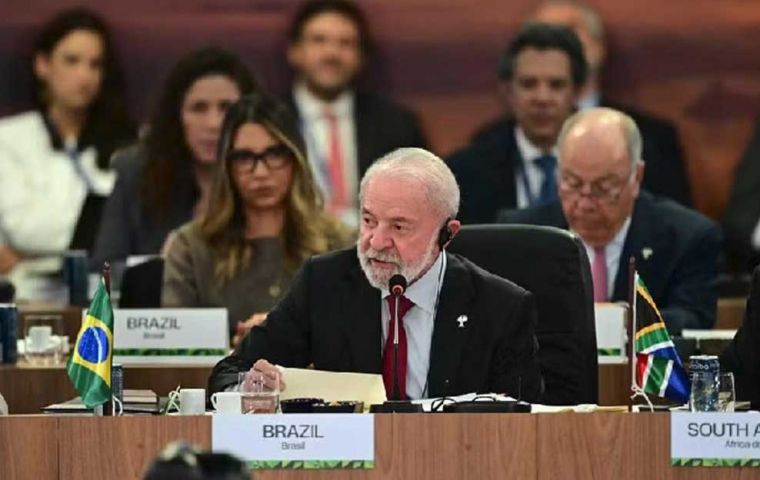MercoPress. South Atlantic News Agency
IMF and WB “a reversed Marshall Plan” says Lula
 “The distortions are undeniable,” Lula said
“The distortions are undeniable,” Lula said Brazilian President Luiz Inácio Lula da Silva Sunday criticized the role of the International Monetary Fund (IMF) and the World Bank (WB) because they represent “a reverse Marshall Plan, in which emerging and developing economies finance the more developed world.”
He made those remarks during his speech at the second plenary session of the BRICS Summit at the Museum of Modern Art (MAM) in Rio de Janeiro, dedicated to strengthening multilateralism, economic and financial issues, and artificial intelligence (AI). The Marshall Plan was the financial aid provided by the United States for the reconstruction of Europe after World War II (1939-1945).
For Lula, while the IMF and the World Bank focus on the developed world, “international aid flows have fallen, and the cost of debt for the poorest countries has increased.”
The president took advantage of the BRICS leaders' meeting, led by Brazil, to call for more power for the countries of the Global South in the IMF, an institution whose missions include cooperating for the proper functioning of the global financial system and collaborating with countries during economic crises.
“The distortions are undeniable,” Lula said. “To do justice to our economic weight, the voting power of BRICS members in the IMF should be at least 25%—not the 18% we currently hold,” he added.
The Brazilian president criticized neoliberalism (the reduction of the state's role in the economy), which he said was responsible for deepening inequalities. “Three thousand billionaires have earned US$6.5 trillion since 2015,” he further noted.
Lula also praised the New Development Bank (NDB), known as the BRICS Bank. “The New Development Bank teaches us a lesson in governance,” he said, citing the recent entry of Algeria and the accession process of Colombia, Uzbekistan, and Peru. For him, it is a testament to the NDB's ability to provide financing for a fair and sovereign transition.
The development bank was created by BRICS in 2015. Since 2023, former Brazilian President Dilma Rousseff has been at the helm of the financial institution, which is headquartered in China. Countries outside BRICS can qualify to participate in the NDB.
Still addressing inequality in the world, Lula defended tax justice (the rich paying more taxes) and combating tax evasion, “fundamental to consolidating inclusive and sustainable growth strategies, appropriate for the 21st century.”
The president also criticized the World Trade Organization (WTO) for “its paralysis and the resurgence of protectionism create an unsustainable situation of asymmetry for developing countries.”
The statement comes in a year in which US President Donald Trump has sparked a tariff war, imposing tariffs on products entering the country, thus protecting American industry from foreign competition.
Lula also said that the BRICS adopted a declaration on artificial intelligence (AI) governance, which represents a “clear and unequivocal message” that new technologies must operate within a fair, inclusive, and equitable governance model.
“The development of Artificial Intelligence cannot become the privilege of a few countries or an instrument of manipulation in the hands of billionaires. Nor is it possible to progress without the participation of the private sector and civil society organizations,” he added.
The Brazilian president emphasized that this 17th meeting of BRICS leaders brings together partner countries for the first time, which “coronates the historic expansion of BRICS.”
Partner country is a modality created at the summit in the Russian city of Kazan in 2024. A key difference between member countries and partners is that partners do not have voting rights in discussions. “The invited countries bring with them perspectives from different regional contexts that enrich the articulation of a vision specific to the Global South,” said Lula.
“BRICS is an indispensable actor in the struggle for a multipolar, less asymmetrical, and more peaceful world,” he declared.
BRICS consists of 11 member countries: South Africa, Saudi Arabia, Brazil, China, Egypt, the United Arab Emirates, Ethiopia, Indonesia, India, Iran, and Russia. These nations represent 39% of the world economy and 48.5% of the global population. Countries with a partner status are Belarus, Bolivia, Kazakhstan, Cuba, Malaysia, Nigeria, Thailand, Uganda, Uzbekistan, and Vietnam.
BRICS identifies itself as nations of the Global South and seeks greater cooperation among its members and more equitable treatment in international organizations. Member countries take turns holding the presidency each year. Brazil will be succeeded by India in 2026. (Source: Agencia Brazil)




Top Comments
Disclaimer & comment rulesNo comments for this story
Please log in or register (it’s free!) to comment. Login with Facebook